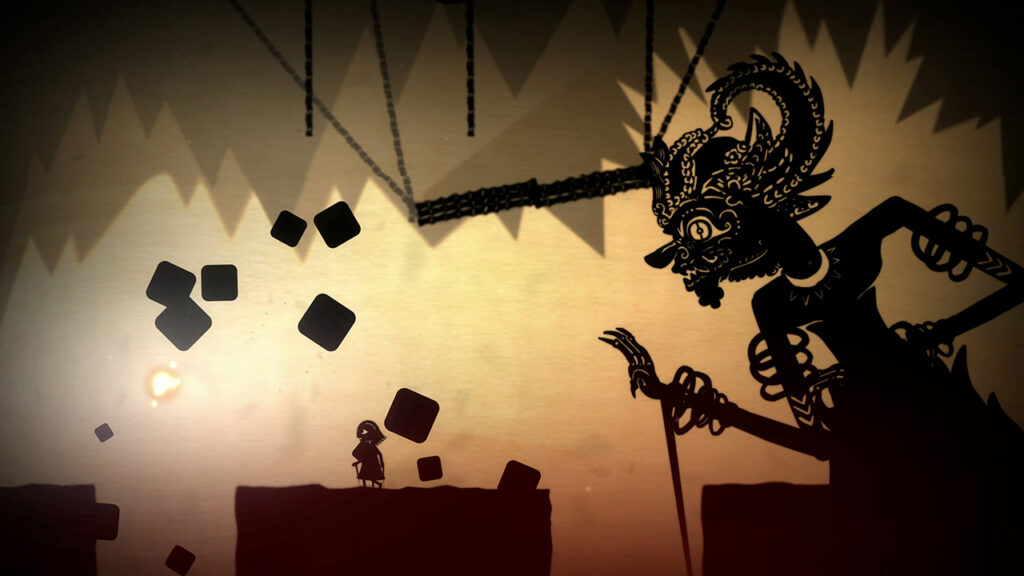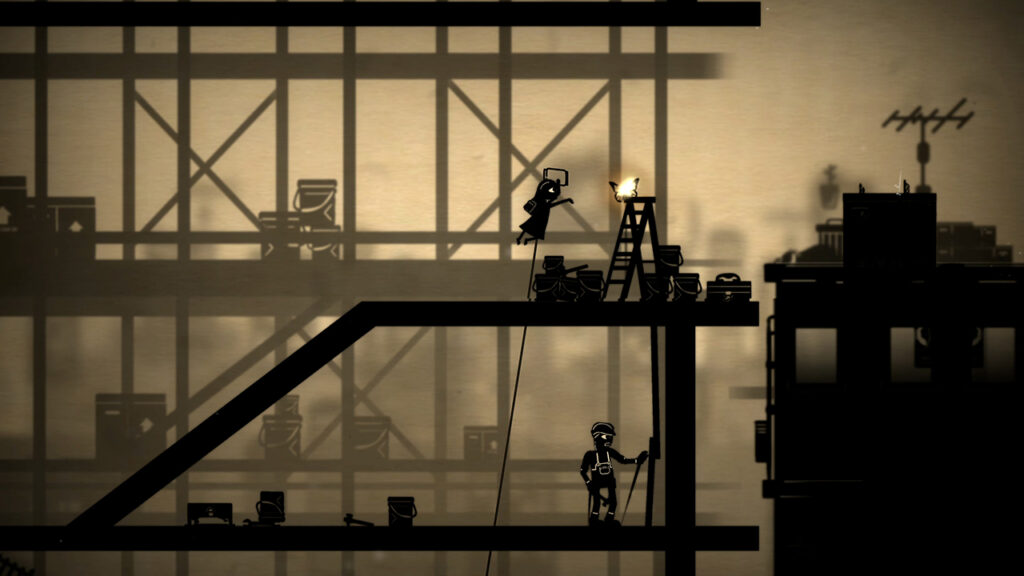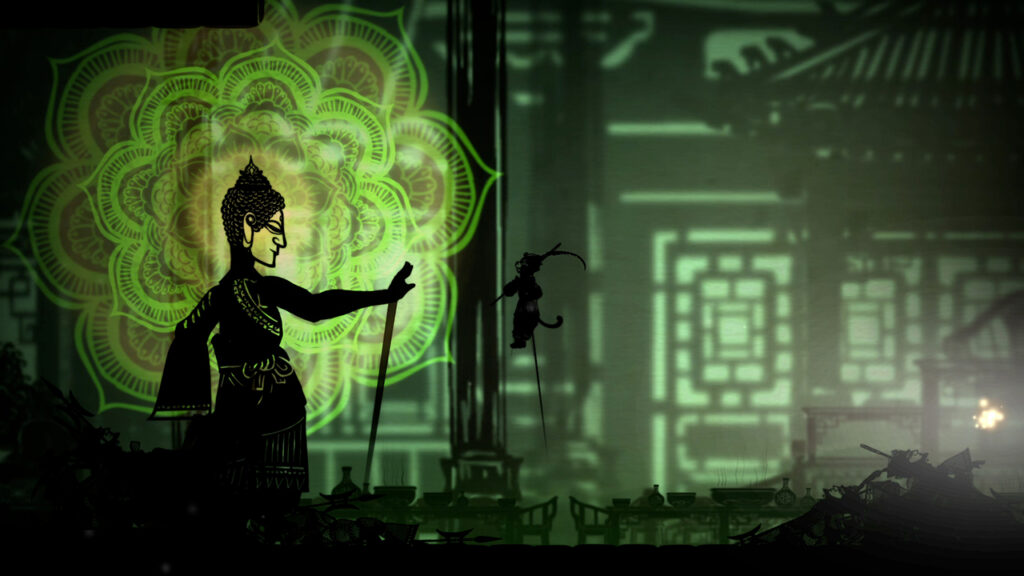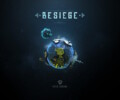
Developer: Shadowplay Studios
Publisher: Blowfish Studios
Platform: Switch, PC, PS4, Xbox One
Tested on: Switch
Projection: First Light – Review
With Projection: First Light, developer Shadowplay Studios is delivering a project that attempts to stand out from the crowd by delivering a shadow theatre inspired concept that is different from most games in the platform genre. The shadow puppet aesthetics certainly are appealing and the game’s storytelling approach attempts to draw players in with the promise of a magical journey. The big question here is of course whether Projection: First Light delivers on that promise, or if it’s a matter of style over substance.
Story
One of the unique features of Projection: First Light is that it is very much a story-driven game, yet the tale that it tells is presented without any dialogue. The game’s storytelling mechanics are those employed by real shadow theatres. Given the game’s aesthetics, this was pretty much the only logical way to implement Projection: First Light’s story, and the game does manage to sell itself. The premise is quite simple: the game tells the story of Greta, a little girl living in a shadow world who becomes enamored by a butterfly made of light. As she follows the butterfly, she causes chaos around her. When her parents punish her on account of the things Greta has inadvertently caused, Greta sneaks out of the house to follow yet another light. It’s the start of a magical journey across the world, and Greta and the light have to work together to make it to the end.
Graphics
Projection: First Light’s visuals are probably the main reason people are drawn to the game. The game’s aesthetics are those of shadow puppet theatres, with the rods that create motion for the characters visible. With shadow and light as the main theme, the game makes ample use of lighting effects, although some of the shadows cast do take on illogical shapes or clip into other parts of the environment where they shouldn’t. As Greta’s journey takes her to various places around the world, there is a variety of styles on display throughout the game even though the worlds all adhere to the same visual rules.
Sound
As there is no story dialogue in the game, the voice acting is also notably absent but what we do get is gentle music. This is fine for the most part but the soothing melodies don’t always line up with some of the more intense parts of the game. The juxtaposition of these relaxing tunes against the concentration necessary to find the perfect position of a shadow can be a bit irksome. Most of the time, however, the game’s soundtrack accompanies the on-screen events perfectly and adds a layer of immersion to the game’s various settings.
Gameplay
Equal parts 2D platformer and puzzle game, Projection offers a unique gameplay experience. You take control of both Greta and the light that she follows around on her journey. Both characters are controlled simultaneously with twin-stick controls. Greta is moved with the left stick and the light with the right one. The light is free to float around and by doing so is able to manipulate the shapes of the shadows that are present in the environment. As Greta is a shadow puppet, she is able to interact with these shadows. By navigating the light through the levels, new paths are created that allow Greta to cross obstacles.
The unique gameplay that is present here allows for the creation of some clever puzzles and interesting challenges. Unfortunately, the game’s control scheme hurts the execution of Projection: First Light’s concept. Manipulating shadows in the right way requires quite a lot of precision and the controls for the light are uncomfortably sensitive. If your controller suffers from even the slightest bit of drift, the game is rendered unplayable, but even with a perfectly calibrated stick, you’ll find that the slightest nudge can create a frustrating experience. It’s a shame, as these issues are probably the result of the game originally having been developed for PC, with the light being controlled by a mouse.
That’s not to say that Projection: First Light is a bad game. On the contrary, there is a lot of fun to be had with Shadowplay Studio’s platformer, but the controller sensitivity is big enough of an issue to point it out as it has a huge impact on how enjoyable the game is. Thankfully, it would be relatively easy to fix the issue with an update that allows a player to set stick sensitivity, so hopefully, this will be implemented in the near future.

That said, the game’s intricate level designs are fantastic and clever. The game makes good use of shadows and is filled with plenty of awe-inspiring moments. This is in part due to the aesthetics that really help to immerse you into the shadow puppet world, but also because the game tries to surprise the player with its mechanics. In later stages, the landscape presents you with moving parts, and as such the shadows of these parts will move as well. Combined with how the shadows’ shapes are determined by the angle with which you shine your light on them, you are then confronted with a platforming experience unlike any you’ve ever seen before. As a final thought, we were a bit surprised to see the game didn’t offer a couch co-op multiplayer mode where one player takes control of Greta and another one controls the light, as this would be a logical inclusion.
Conclusion
Projection: First Light takes a relatively simple concept and applies it to pretty much every aspect of the game. The gameplay, visuals and storytelling without dialogue all come together in an experience that is inspired by a traditional art form. The execution isn’t perfect, however, and the game could have used a little more polish, especially when it comes to the controls and the music but overall, Projection: First Light is definitely worth a look.
Projection: First Light - Review,







No Comments